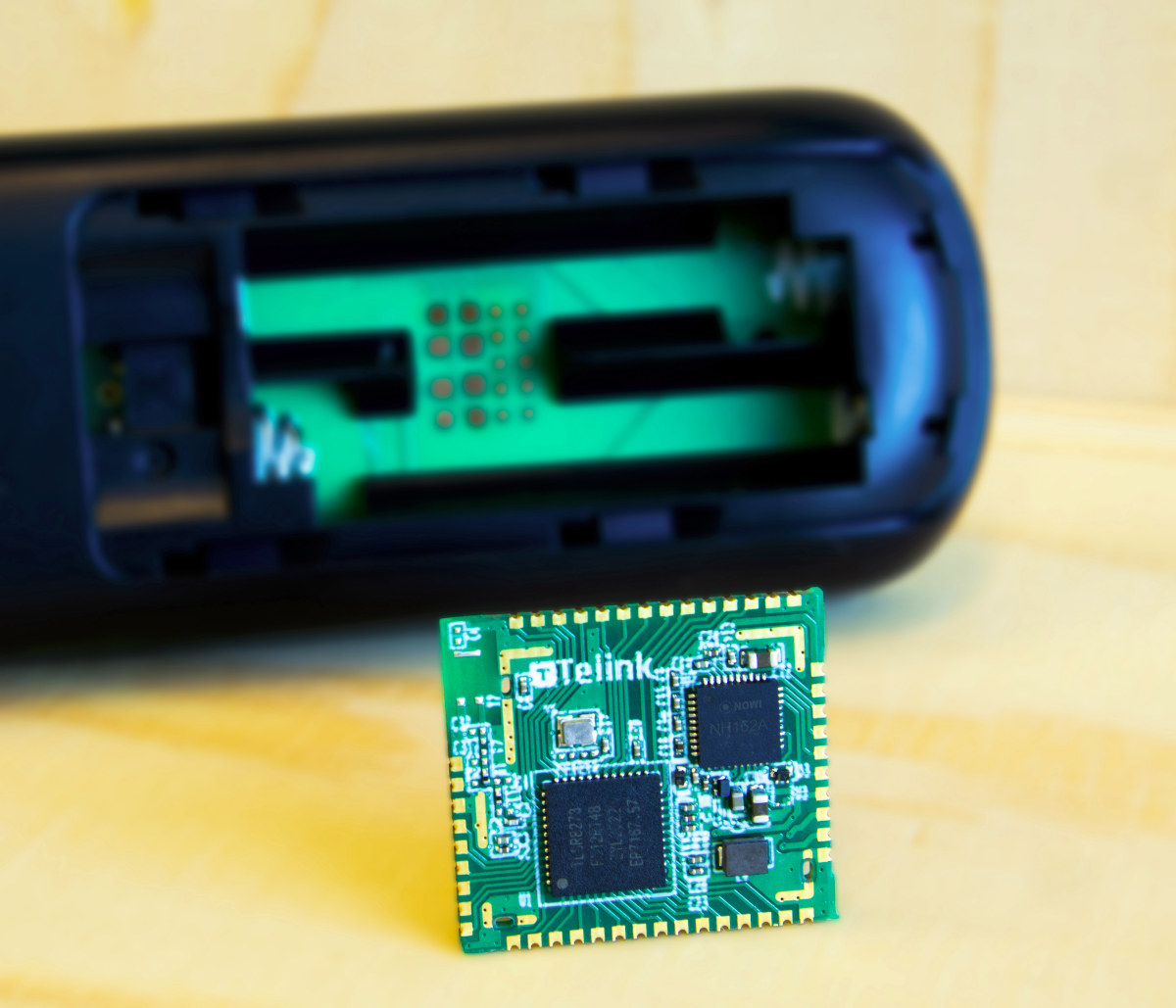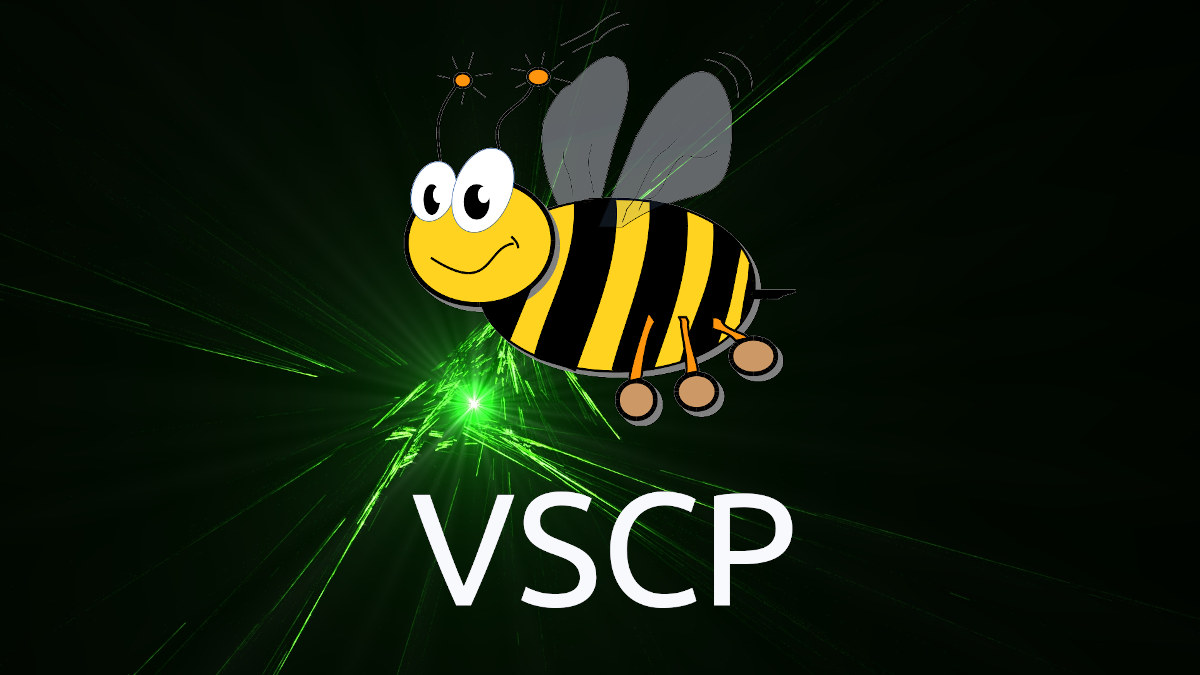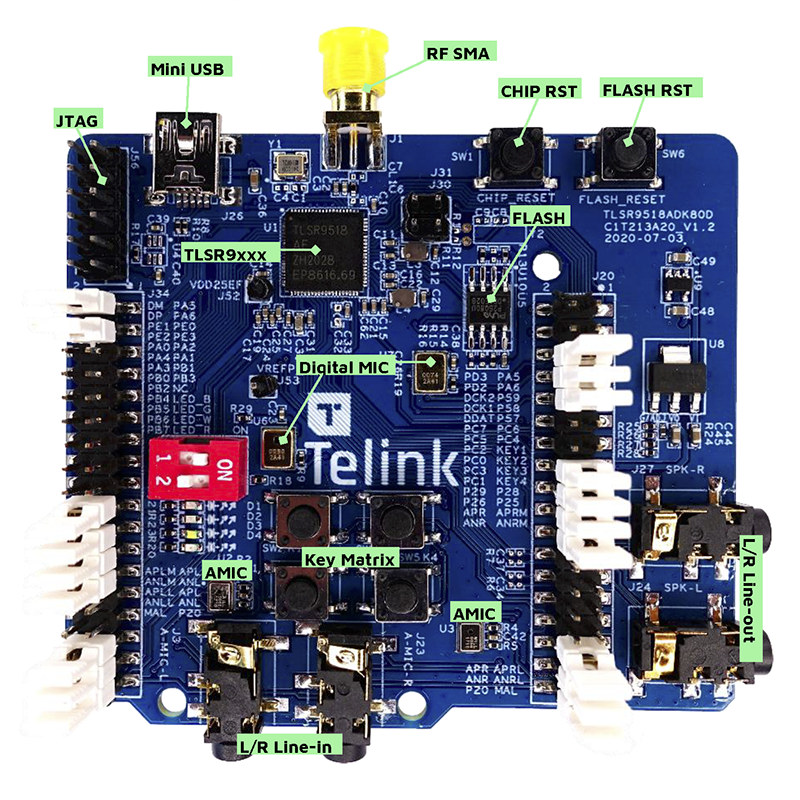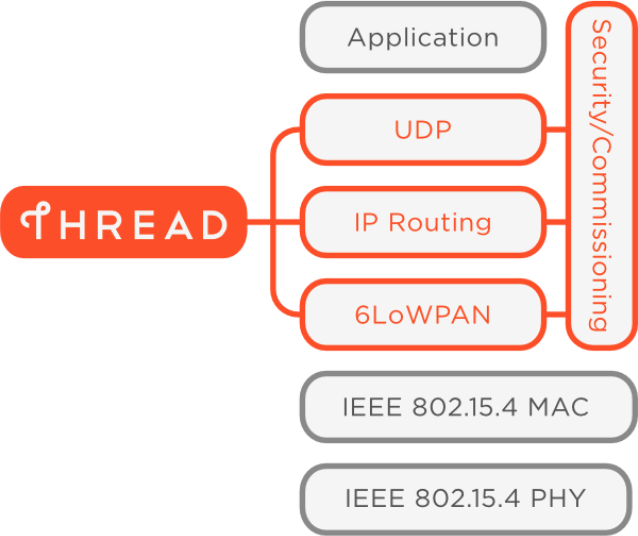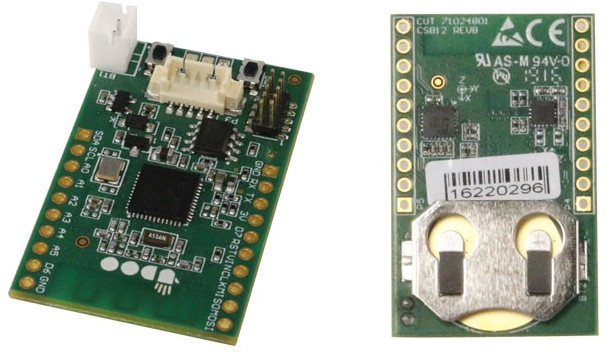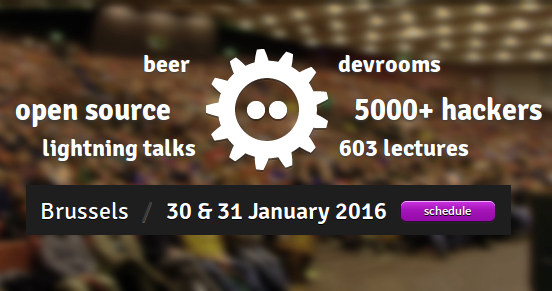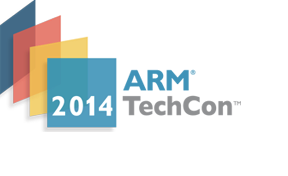Telink TLSR8273-M-EH is a multi-protocol wireless connectivity module with energy harvesting capabilities implemented through Nowi’s PMIC, and designed for batteryless devices (or ones with “forever batteries”) such as TV remote controls, but also wearables, and electronic shelf labels among others. The solution is based on a 48MHz RISC microcontroller that supports Bluetooth 5.1 LE, 802.15.4 (Zigbee/RF4CE/6LoWPAN/Thread), and 2.4GHz proprietary protocols. With a single module integrating all main components required for batteryless operation, Telink says its solutions reduce BOM and size, as well as supply chain complexity, and improves user-friendliness by removing the need for battery swaps. Telink TLSR8273-M-EH specifications: Core – 32-bit RISC microcontroller @ up to 48 MHz (CoreMark 1.25/MHz) Memory – 64 KB SRAM with 32 KB retention Storage – 512 KB flash RF Bluetooth 5.1 LE up to 2 Mbps, with AOA/AOD support, Bluetooth Mesh IEEE 802.15.4 radio for Zigbee, RF4CE, 6LoWPAN, Thread 2.4GHz proprietary protocols RX […]
Open-source VSCP IoT/M2M automation framework supports Arduino, Raspberry Pi
VSCP (Very Simple Control Protocol) is an open-source IoT framework that works on development boards like Arduino or Raspberry Pi, and lets you control IoT home automation tasks. The framework is highly scalable, has a very low footprint, and as such is specially designed for resource-limited devices. VSCP is an open-source standard protocol for m2m, IoT and other remote control and measurement applications. It enables simple, low-cost devices to be networked together with high-end computers and/or to work as an autonomous system, whatever the communication media is. The VSCP Protocol has two levels: Level 1 and Level 2. The protocol was primarily used in CAN networks (that is Level 1 for tiny microcontrollers) because CAN is cheap and reliable with high efficiency. However, VSCP can be used for faster transport layers such as TCP/IP, so here comes Level 2 which achieves better performance. We have already seen Souliss, an open-source […]
Telink TLSR9 Wireless Audio & IoT RISC-V SoC integrates RISC-V DSP/SIMD P-extension
At the end of last month, there was a lot of buzz about Bouffalo BL602, one of the first RISC-V SoC with built-in wireless connectivity, namely WiFi 4 and Bluetooth 5.0 LE. We should expect more and more of those types of solutions, and Telink & Andes jointly introduced TLSR9-series of wireless audio chips for hearables, wearables, and other high-performance IoT applications. The chips are powered by an Andes D25F RISC-V 5-stage core that happens to be the first core to integrate RISC-V DSP/SIMD P-extension and offer Bluetooth 5.2, Zigbee 3.0, HomeKit, 6LoWPAN, Thread, and/or 2.4 GHz proprietary protocol. The press release focuses on the Andes core, but an article in Chinese allows use to find more about Telink TLSR9 family’s key features: CPU – Andes D25F 32-bit RISC-V 5-stage core @ up to 96 MHz (2.59 DMIPS/MHz and 3.54 CoreMark/MHz) with RISC-V DSP/SIMD P-extension Optional NNU – AI engine […]
Google Announces LoWPAN/Thread Support in Android Things DP 6.1
Not to be confused with LPWAN (Low Power Wide Area Network), LoWPAN (Low Power Wireless Personal Area Network) solutions are designed for peer-to-peer usage on constrained battery-powered devices using standard procotols like HTTP and CoAP. Based on 6LoWPAN and 802.15.4, Thread is one of those LoWPAN standards, and Google has just added API support for configuring and managing LoWPAN as a part of Android Things Developer Preview 6.1, including networking support for Thread. Google explains “these types of low-power connectivity solutions enable Android Things devices to perform edge computing tasks, aggregating data locally from nearby devices to make critical decisions without a constant connection to cloud services”. You can read LoWPAN API guide to learn more details on building your own apps to create and join local mesh networks, but to quickly get started OpenThread running on Nordic Semi RF52840-PDK is recommended. You’ll first need to install the firmware and […]
UDOO BLU and BLU SENSE IoT Modules Integrate Bluetooth LE, Zigbee, and 6LOWPAN Connectivity
UDOO is known for their Linux boards based on NXP and Intel processors for makers and the education market such as UDOO NEO or UDOO x86, but the company has now developed UDOO BLU and BLU SENSE battery powered modules based on Texas Instruments CC2650 ARM Cortex M3 microcontroller, both with Bluetooth LE, Zigbee, and 6LOWPAN connectivity, and the SENSE model adds some extra sensors. UDOO BLU and BLU SENSE specifications: Wireless MCU – Texas Instruments CC2650 ARM Cortex M3 MCU @ 48 MHz with 128KB flash, 8KB SRAM with 2.4 GHz radio Connectivity – Bluetooth Low Energy (BLE), ZigBee, 6LoWPAN Sensors (BLU SENSE only) – NXP FX0S8700CQ accelerometer & magnetometer sensor, NXP FXAS21002C gyroscope & temperature sensor Expansion 1x 5-pin sensors Snap-In I2C connector for UDOO Bricks 2x 10-pin headers with 8x Digital GPIOs, 6x ADCs, 1x I2C, 1x SPI, 1x UART Misc – 3x User Configurable LEDs (Red, […]
FOSDEM 2017 Open Source Meeting Schedule
FOSDEM (Free and Open Source Software Developers’ European Meeting) is a 2-day free event for software developers to meet, share ideas and collaborate that happens on the first week-end of February, meaning it will take place on February 4 & 5, 2017 this year. FOSDEM 2017 will features 608 speakers, 653 events, and 54 tracks, with 6 main tracks namely: Architectures, Building, Cloud, Documentation, Miscellaneous, and Security & Encryption. I won’t be there, but it’s always interesting to look at the schedule, and I made my own virtual schedule focusing especially on talks from “Embedded, mobile and automotive” and “Internet of Things” devrooms. Saturday 4, 2017 11:00 – 11:25 – Does your coffee machine speaks Bocce; Teach your IoT thing to speak Modbus and it will not stop talking, by Yaacov Zamir There are many IoT dashboards out on the web, most will require network connection to a server far […]
FOSDEM 2016 Schedule – Open Source Hardware and Software Event in Europe
FOSDEM (Free and Open Source Software Developers’ European Meeting) is a 2-day event that usually takes place on the first week-end of February in Brussels, but this year it will be on January 30-31. The event brings thousands of developers, hackers, and other person interested in open source technology who present their projects and share ideas. FOSDEM 2016 schedule is now available, and There will be 557 speakers, 612 events, and 50 tracks this year including 7 main tracks: Distros, Enterprise, Hardware, Communications, Miscellaneous, Office, Systems Administration, and Virtualization. So I’ve had a look at some of the talks, especially out of “Embedded, Mobile and Automotive” and “IoT” devrooms, and prepared my own virtual schedule although I won’t be able to attend. Saturday 10:30 – 10:55 – MIPS, the other side of the embedded by Alexjan Carraturo For many years MIPS processors have been involved in the embedded market, particularly […]
ARM TechCon 2014 Schedule – 64-Bit, IoT, Optimization & Debugging, Security and More
ARM Technology Conference (TechCon) 2014 will take place on October 1 – 3, 2014, in Santa Clara, and as every year, there will be a conference with various sessions for suitable engineers and managers, as well as an exposition where companies showcase their latest ARM based products and solutions. The detailed schedule for the conference has just been made available. Last year, there were 90 sessions organized into 15 tracks, but this year, despite received 300 applications, the organizers decided to scale it down a bit, and there will be 75 session in the following 11 tracks: Chip Implementation Debugging Graphics Heterogeneous Compute New Frontiers Power Efficiency Safety and Security Software Development and Optimization Software Optimization for Infrastructure and Cloud System Design Verification There are also some paid workshops that take all day with topics such as “Android (NDK) and ARM overview”, “ARM and the Internet of Things”, or “ARM […]


